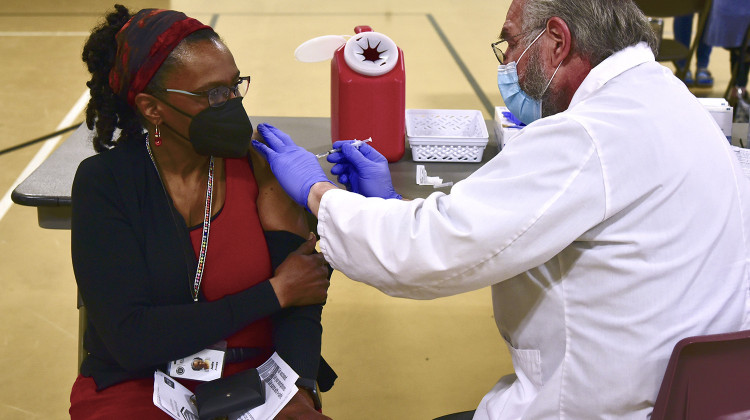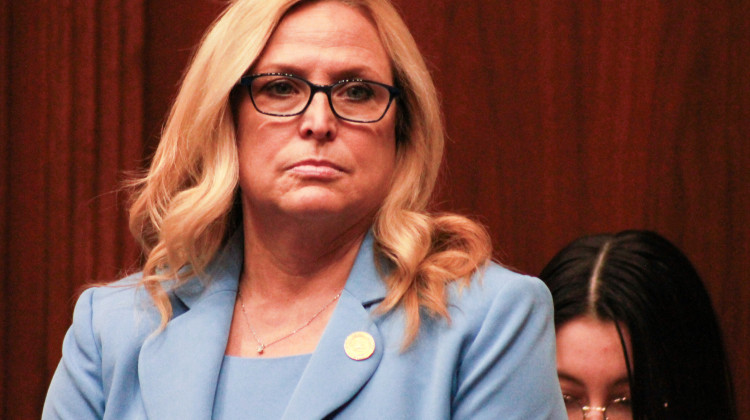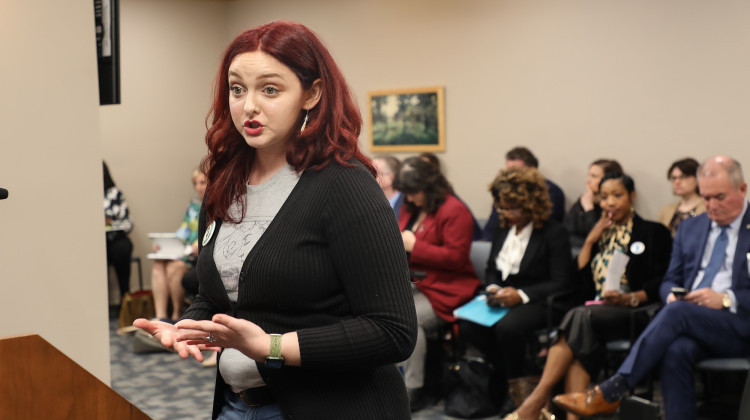
Along Indianapolis's Monon Trail, signs offer guidance on how to maintain social distancing from other trail users.
Lauren Chapman/IPB NewsThe Indiana State Department of Health reported 51 additional confirmed deaths over the weekend, bringing the state’s total to 1,379. The state announced more than 24,000 total confirmed cases, with more than 140,000 Hoosiers tested.
State Revenue Nearly $1 Billion Below Forecast Due To Delayed Tax Filing, Business Closures
The total revenue generated by the state in April is nearly 50 percent less than projected. The state’s budget director says it’s hard to predict what might happen in May.
The state was essentially on track to meet projections even after March revenues. But with April’s expected drop, the state is now 7 percent – nearly $1 billion – below projections.
Indiana Office of Management and Budget director Cris Johnston says nearly 80 percent of that is because of pushing back the tax filing deadline from April to July. The rest of that is reflected in other tax sources – including sales tax, which is reported on a one-month delay.
READ MORE: Governor Holcomb Outlines How – And Why – The State Will Reopen
Join the conversation and sign up for the Indiana 2020 Two-Way. Text "elections" to 73224. Your comments and questions in response to our weekly text help us find the answers you need on COVID-19 and the 2020 election.
Lumina And Gallup Jobs Study Emphasizes Need For Certifications
A recent report from Gallup and Indianapolis-based Lumina Foundation says workers with certifications have more stable and fulfilling jobs. Lumina says that insight could help inform the state’s re-employment services during the pandemic.
The national study says there’s an association between workers who have professional certifications and good jobs – defined by having higher pay, more stability and opportunities for career advancement.
Credentialed workers in industries like manufacturing and retail also reported markedly higher satisfaction in their work.
State Health Commissioner: ‘Changed Behaviors’ Will Be Reason State Can Stay Open
Indiana Health Commissioner Dr. Kris Box is reminding Hoosiers of the importance of following COVID-19 safety precautions as “Stay-At-Home” restrictions are lifted across the state.
Box says the only reason Indiana can start to reopen – and stay reopened – is changed behaviors.
“We’ve stayed home, especially when you’re sick. We’re disinfecting surfaces more and more; we’re washing our hands. We’ve avoided large groups,” Box says. “And we have to keep doing that.”
Box emphasizes the importance of wearing a mask when around other people outside the home – even though she says some people might think that’s “overkill.”
Box says the “new normal” will look different – but it’s safer.
New CARES Act Guidance Creates Confusion, Offers Private Schools More Emergency Funds
Education Secretary Betsy DeVos's latest guidance on emergency relief money for K-12 schools has education leaders puzzled. The U.S. Department of Education's recent directive means private schools will get a larger share of emergency aid funding – while low-income schools will get less.
As written into the federal CARES Act, financial support from the Elementary and Secondary School Emergency Relief (ESSER) fund is supposed to go to schools – public and private – based on their number of low-income students, also known as Title I formula. But the new, unexpected guidance contradicts that idea and says the limited pot of funding going to school districts should be shared with private schools based on total enrollment instead.
Executive director of the Indiana Association of School Business Officials, Denny Costerison, says it took a lot of people off guard.
"It was definitely a surprise, definitely not anticipated by anybody," he says.
According to the Indiana Department of Education (IDOE), the guidelines will triple the amount of funding available to support private schools in Indiana, while reducing funding available for low-income public schools.
Indiana National Guard To Provide PPE For Polling Places Ahead Of Primary Election
The Indiana National Guard is working with the Secretary of State’s office to distribute personal protective gear for polling places for the primary election.
Brig. Gen. Dale Lyles says the Guard worked with Republicans and Democrats to get an idea of how much PPE is needed at sites.
“And over the course of the next five to 10 days we will be delivering enough PPE for all the workers at those sites to be protected,” Lyles says.
Lyles says the Secretary of State’s office has a plan for social distancing at polling sites.
When Inmates Get COVID-19, Families Are Kept In The Dark
Sherrie Sanders says she last spoke with her husband, George, on April 12. It was Easter Sunday.
“He told me he was very sick. He had a fever of 102,” she says. “He knew he had [COVID-19], but they weren’t checking him. That’s the last I heard from him.“
Sherrie says her husband has diabetes and other medical issues that make him susceptible to even minor illnesses. “Whenever he gets sick, he’s hospitalized.”
So she worried when she lost touch. Sherrie says she is listed as George’s emergency contact and has power of attorney over medical decisions, but the Westville Correctional Facility was unwilling to tell her anything about his status, citing patient privacy concerns.
George didn’t call on their anniversary, Sanders says, or his birthday on April 26. Other prisoners and their families reported that he had been hospitalized, but it was unclear what happened next. Some said he had died. A journalist forwarded her an email saying that George, who was convicted of dealing methamphetamine, had been released from the hospital on April 24.
But four weeks after she last heard from him, the prison still hasn’t provided information about George—even after she reached out to the chaplain and hired an attorney to talk to the warden.
'Starting Up Is Going To Be A Lot Harder': Communities Search For Recovery Following Shutdown
As Indiana begins to slowly reopen, cities and towns are counting on economic activity returning. Experts say some communities are primed for a recovery faster than others.
“It was pretty easy for everybody to shut down once we realized how much of a crisis was,” says Drew Klasic, a senior policy analyst at Indiana University’s Public Policy Institute. “Just turning off the switch wasn’t very challenging once the NBA and others kind of made it easy for government and businesses.”
However, Klasic says, “Starting up is going to be a lot harder so keep that in mind. We’re not going to start up nearly as fast as we shut down.”
He regularly advises government officials on best-practices. That advice now is more difficult because data is so scarce.
But data that is available paints a grim picture for many communities. Unemployment claims across the state – and country – have skyrocketed in recent weeks. An estimated 17 percent of Indiana’s labor force has now filed for unemployment.
Contact Lauren at lchapman@wfyi.org or follow her on Twitter at @laurenechapman_.
This is a rapidly evolving story, and we are working hard to bring you the most up-to-date information. However, we recommend checking the websites of the Centers for Disease Control and Prevention or the Indiana State Department of Health for the most recent numbers of COVID-19 cases.
 DONATE
DONATE






 Support WFYI. We can't do it without you.
Support WFYI. We can't do it without you.